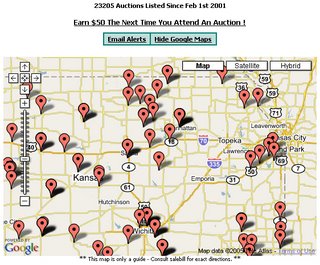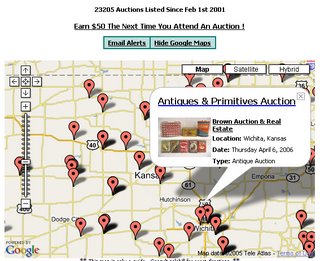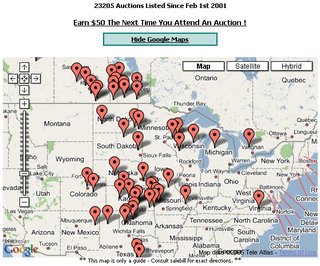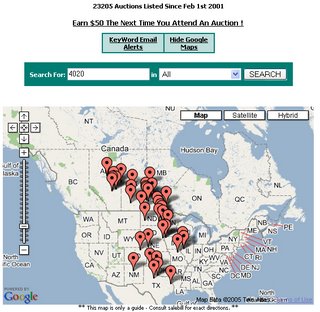Used Car Auctions: Do's and Dont's
by: Thomas H. Miller
This is Part 1 of a 4 part series on how to buy a car at an auction
So you are looking for a car or truck, but you're tired of running around town and finding other people selling their "headaches" through the local classifieds, or dealers offering "cream-puffs" for inflated retail prices. All you want is a good vehicle for a good price. Period. Does such a deal exist? Yes, indeed! Repossession auctions are becoming more and more popular across the country. I have been attending them for over 20 years, and have purchased many cars and trucks at bargain prices - everything from a brand new car (still with the window sticker on it and 3 miles on the odometer) for $1,100 below the sticker price, to a conversion van with 99,000 miles on it. Both of these vehicles are still in the family and running strong.
1. What I'd like to do here is share my experiences with you, and give you some tips on how you, too, can find these bargains.
First of all, how do you find the auctions? Your local paper is a good place to start. Many banks and other financial institutions (such as GMAC) list the times and places of their auctions in Sunday papers under "Auctions" or "Cars for Sale". Also, if there is a "legal publication" in your area, that publishes court proceedings, bankruptcy notices, etc., this is another source for repossession auto auction notifications. One other way to find them is to call your local banks and ask for the Installment Loan Department. They should be able to provide you with details on their particular auctions. Many even have regular mailing lists, where they will automatically send you a notification of their auction and even a listing of what vehicles will be included. While some institutions restrict their auctions to dealers only, most will allow the public to attend and bid. Once you have found an auction, be sure to get all the details BEFORE you go. You'll need to know if there are any minimum bid requirements, what type of payment they need, and what type of paperwork they provide to the purchasers. Many auctions will sell everything to the highest bidder, no matter how low the bid is. Still others may have a minimum bid they must get, or they "buy back" the car and save it for the next auction. Most institutions retain the right to bid, so be aware that you may be not only be bidding against other people interested in the vehicle, but also against the auctioneer!
While most auctions will publish their requirements for payment along with the auction notification, DON'T assume that that's all there is to it. Find out if they expect cash only, certified checks or personal checks. Also, many require full payment immediately after the sale, while others may require a non-refundable deposit with the balance due in a few days. All too often I have seen people make costly errors at auctions because they didn't understand these payment rules.
In this day and age of red tape, titles, liens, etc., the paperwork an institution provides is as important as anything else. In New York State, for example, if the institution sells the vehicle with "as-is" marked on the bill of sale, you may encounter a legal nightmare that involves a major full-vehicle inspection and an 8 to 10 week wait for a title search and registration procedure that will prevent you from putting the vehicle on the road for months. It is imperative, therefore, that you find out specifically what paperwork the institution will give you when you purchase a vehicle through their auction. If you plan on registering the car right away, tell them that and make sure you are satisfied that they will give you what you need. If in doubt, contact your local Motor Vehicle office ahead of time to insure that you'll be able to proceed with what the institution will be giving you. Laws vary dramatically from state to state. Above all, make sure that all liens have been satisfied before you purchase a repossessed vehicle. Most banks and financial institutions will give you some type of form to verify this.
OK... now you've found the auction and understand the rules and requirements. The next step is finding the vehicle that fits your needs. In order to know what the vehicle's value is before you bid on it, you'll need a good resource of wholesale and retail pricing. One good source is the NADA "Blue Book". This book lists cars and light trucks by manufacturer and body style, giving you the current average wholesale and retail for each. I have used a book called "Edmund's Used Car Prices" for the past 15 years or so, and found them to be a very reliable source. Like the NADA book, it lists the cars and light trucks by manufacturer and year (usually the past 7 model years), and provides the vehicle's original list price, current average wholesale and retail. It also provides you with a list of popular options, and what they add to the value of the car or truck. There's plenty of details in the book which I won't go into here. Just make sure you read the "How to Use This Book" section thoroughly before you start using it. Options such as air conditioning, power steering and brakes and type of transmission may dramatically affect the value of the vehicle. Also, excessive mileage for that particular year car or truck will affect the value. So, read the book and know how to use it BEFORE you get to the auction.
Visit my site at www.helpmebuyacar.bravehost.com
About The Author
My name is Thomas Miller, I'm student here in Detroit, MI. I love to do research, I love to write and most of all I cars.
Copyright © 2001-Present ArticleCity.com




